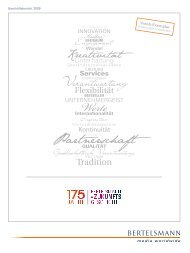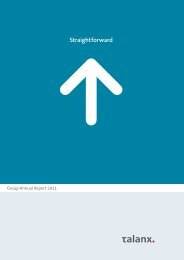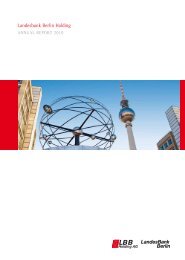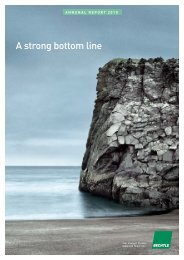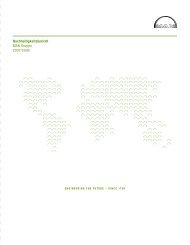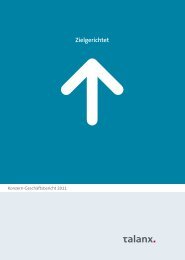Values
Values
Values
You also want an ePaper? Increase the reach of your titles
YUMPU automatically turns print PDFs into web optimized ePapers that Google loves.
CLUB EXPANSION<br />
ABROAD:<br />
From 1962, the book club<br />
expands worldwide:<br />
1962 Spain<br />
1966 Austria (Donauland;<br />
joint venture)<br />
1967 Netherlands<br />
1969 Mexico, Colombia<br />
1970 France<br />
1971 Portugal, Argentina,<br />
Venezuela (takeover)<br />
1972 Brazil<br />
1973 Denmark (record club;<br />
subsidiary)<br />
1975 Norway (record club;<br />
subsidiary)<br />
1977 UK, Ecuador, Uruguay<br />
1978 Costa Rica, Peru, Chile<br />
1980 Israel<br />
1986 Australia/New Zealand<br />
(takeover)<br />
1987 USA (takeover)<br />
1992 Czech Republic<br />
1994 Poland<br />
1997 China<br />
2004 Ukraine (takeover)<br />
stores, and these customers then have<br />
the opportunity to buy books from other<br />
publishers.<br />
Business booms. By the end of 1950,<br />
the book club has 50,000 members, and<br />
by one year later that number has tripled.<br />
By 1955, the number of subscribers<br />
has reached 1.5 million. Bertelsmann<br />
has to move quickly to buy more and<br />
more licenses in order to be able to offer<br />
more titles. Red Lesering buses can soon<br />
be found at many market squares, advertising<br />
for membership in the book<br />
club.<br />
In the mid-1950s, many people in<br />
Germany have diffi culties in accessing<br />
books. Bertelsmann prides itself on selecting<br />
books for its customers, who are<br />
interested in new literary trends – that<br />
makes it easier for them to decide which<br />
books they’ll buy. The company is soon<br />
focused on bestsellers, entertaining<br />
books that invite readers to browse. But<br />
decorative books in leather covers and<br />
stamped gold leaf are also in high demand.<br />
After all, the books should look<br />
impressive on the shelf at home.<br />
The books which are automatically<br />
sent to customers who don’t specify other<br />
titles in their order also perform well.<br />
They’re considered to be the Lesering’s<br />
“insider picks.” The novel “Gone with<br />
A modern bookstore in Berlin called “Zeilenreich.”<br />
It is operated by the Direct Group which also runs the book clubs.<br />
the Wind,” for example, sells more than<br />
half a million copies in the 1950s. In<br />
comparison, conventional bookstores<br />
had only managed to sell around<br />
100,000 copies.<br />
Such turnover means rapid growth<br />
for Bertelsmann. In 1950, there were<br />
around 400 people working in Gütersloh,<br />
but by 1955, the company is already<br />
employing 2,200 people and has a<br />
second location in Rheda.<br />
But the expanding publisher is also<br />
the target of criticism. Some of the promoters<br />
it’s been working so successfully<br />
with turn out to be using dubious methods.<br />
They harangue housewives and<br />
students to get permission to send them<br />
a catalogue – no strings attached. But<br />
having given their address and signature,<br />
many of these people suddenly<br />
fi nd they’d become new Lesering members<br />
who are required to place an order.<br />
Bertelsmann doesn’t ignore the problem,<br />
and takes action against such promoters.<br />
But for a long time, the club’s<br />
image is somewhat tarnished by the<br />
pushy sales tactics.<br />
Reinhard Mohn and Fritz Wixforth<br />
are convinced that the book club will also<br />
work in other countries. They choose<br />
Spain as their fi rst foreign market. In<br />
1962, the Círculo de Lectores is estab-<br />
lished in Barcelona – and its similar concept<br />
soon leads it to huge success.<br />
The results in Spain spur on the<br />
team in Gütersloh: In the years that follow,<br />
they expand to countries such as<br />
Austria, France, and several South<br />
American countries. Then comes the<br />
peak of the Bertelsmann book club.<br />
In 1964, a chain of stores springs up<br />
all over Germany. By 1969, these stores<br />
are called “Club Centers.” Later, the<br />
whole Lesering company is renamed into<br />
“Club Bertelsmann.”<br />
Given the rise of new media, it seems<br />
only logical today that a book club can’t<br />
continue on the old road to success. And<br />
so it was that Bertelsmann saw big declines<br />
in its membership numbers. While<br />
Lesering still had 5 million members at the<br />
start of the 1980s, today there are around<br />
2.7 million. Despite this, fresh ideas enabled<br />
the clubs to keep customers, and also<br />
to win over new fans. But much more importantly<br />
for the development of the<br />
Group as a whole, at the time the profi ts<br />
from the club business – combined with<br />
other lucrative businesses – had made it<br />
possible for Bertelsmann to invest in new<br />
media early on, build new revenue mainstays,<br />
and expand internationally. All<br />
thanks to the million-strong club that<br />
started as a small readers’ circle.<br />
– 9 –





